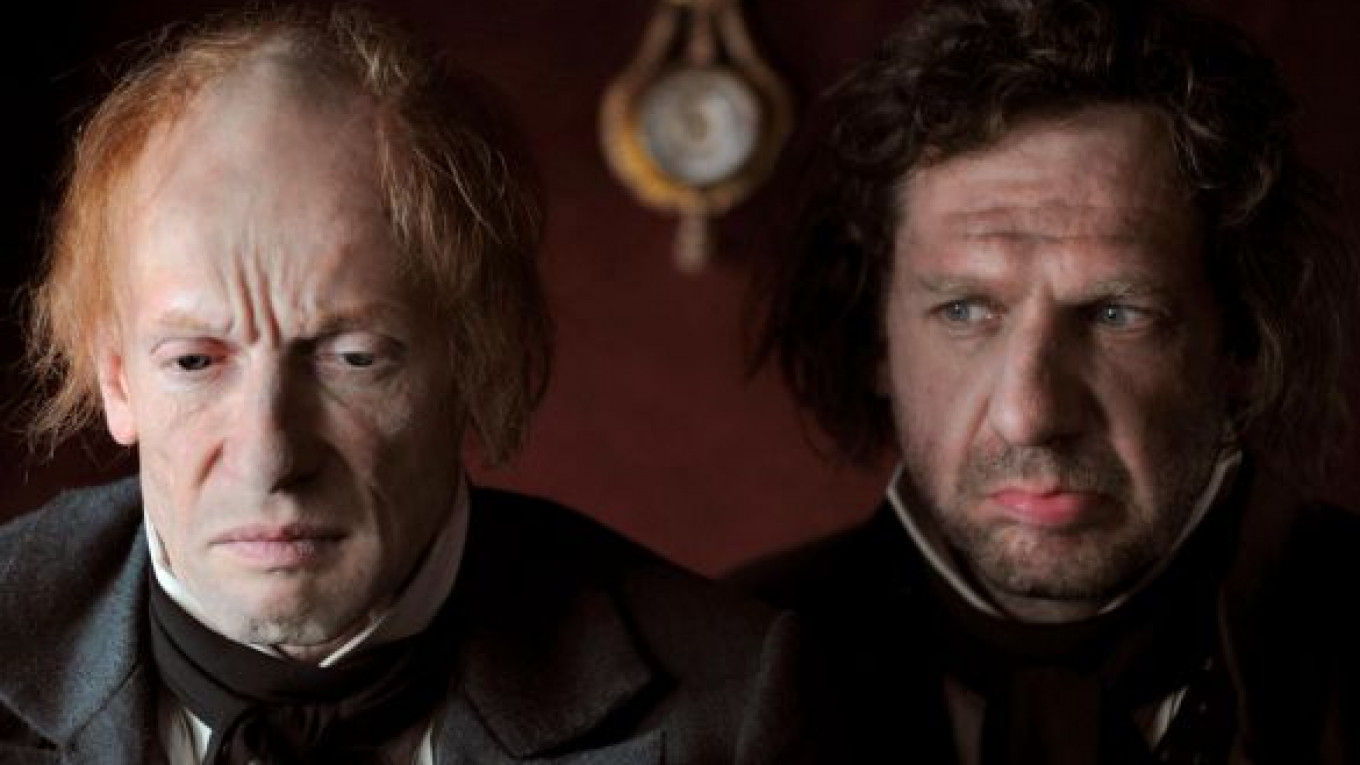Pure evil reigns in Alexander Sokurov's new film "Faust," which won the Golden Lion at last year's Venice Film Festival and starts screening in Russian movie theaters on Feb. 9. The director plunges audiences into a unipolar world in which all things cruel, brutal and despicable flourish — and have long combated all things positive. The effects of this experience were described by director Darren Aronofsky, head of the jury in Venice, as "a life-changing experience."
As its name suggests, the film was inspired by Goethe's interpretation of the legend. Sokurov's take on it, however, makes a striking departure from that of the German poet. In Goethe's work, the story revolves around the fight between good and evil. Sokurov, by contrast, creates a reality from which good is exempt in the first place.
In a way, Sokurov's film, which is in German with a Russian voiceover, resembles a painting, or rather a shadowy ancient print that has lost color over the years. Visually, it is very dense and detailed. The main two themes of the painting are landscape and anatomy. The film opens with a divine landscape of a small German town, which is followed by the sight of the main character, Dr. Faust (Johannes Zeiler) examining the insides of a rotting corpse. Faust is looking for a human soul, but in vain.
"Faust" is highly physiological, in the less pleasant senses of the word. Images of pigs, rats, insects, decay and piles of garbage create an intoxicating fusion that viewers can almost smell.
Like in Goethe's work, Faust falls victim to his curiosity and craving for knowledge. He seeks to establish the borders of the human soul, and sells his soul to Mephisto for the love of Margarete (Isolda Dychauk).
"Faust" is the fourth, final part in Sokurov's tetralogy about the corrupting nature of power. As with Hitler in 1999's "Moloch," Lenin in 2001's "Taurus," and Hirohito in "The Sun" (2004), Sokurov portrays the main character during a time of crisis.
It is the process of a human being striking a deal with the devil that interests Sokurov. "It is at this very moment of accepting the conditions of the deal that a person betrays themself," the director said.
In the film, the moment when Faust gets what he wanted — to make love to Margarete — is shown metaphorically. The couple falls into dark water, literally falling below. Sokurov treats the literary element of the story liberally, changing the sequence of events, inventing new characters, such as Faust's father, and altering parts.
We first see Faust as poverty-stricken and starving. But soon his basest instincts — greed and then lust — kick in, and events escalate, pulling the doctor into the abyss.
What is supposed to be a love story between Faust and Margarete is rendered a loveless experience. What fuels Faust is a concoction of his most unscrupulous thoughts and most despicable motives.
"It is remarkable how difficult it is to impress or surprise people by doing good things; at the same time every day we are shocked by the scale, the depth and the range of damage that one human being can do to another one," Sokurov told audiences before the St. Petersburg premiere of the film.
It is no coincidence that Sokurov turned Mephisto (Anton Adasinsky) into a revolting-looking old pawnbroker, who looks like a hybrid between man and goat.
"We deliberately made a direct, in-your-face connection between Mephisto and money," Sokurov said. "It makes the story resonant with modern Russia, with so many empty hearts and full pockets. People wanting to strike a deal with Mephisto could form a huge line. And Mephisto would not have to court potential clients here."
"Faust is as real as Hitler, Lenin and Hirohito in the sense that the story that we tell in the film is a very human story that could happen in real life," Sokurov said. "You can watch the series in any sequence — it's a bit like going around in a circle — and it will come down to Faust in the end."
The Moscow premiere of "Faust" took place at Barvikha Luxury Village in the wealthy suburb of Rublyovka, the home of the Russian elite, and the lavish red-carpet event, sponsored by Hennessy cognac and Godiva chocolatier, was a stark contrast to the revolting, grainy world of Sokurov's latest film. Guests at the premiere included Tatyana Yumasheva, daughter of the late Russian president Boris Yeltsin, Natalia Solzhenitsyn, wife of the late author Alexander Solzhenitsyn, and a mix of pop stars and actors.
A Message from The Moscow Times:
Dear readers,
We are facing unprecedented challenges. Russia's Prosecutor General's Office has designated The Moscow Times as an "undesirable" organization, criminalizing our work and putting our staff at risk of prosecution. This follows our earlier unjust labeling as a "foreign agent."
These actions are direct attempts to silence independent journalism in Russia. The authorities claim our work "discredits the decisions of the Russian leadership." We see things differently: we strive to provide accurate, unbiased reporting on Russia.
We, the journalists of The Moscow Times, refuse to be silenced. But to continue our work, we need your help.
Your support, no matter how small, makes a world of difference. If you can, please support us monthly starting from just $2. It's quick to set up, and every contribution makes a significant impact.
By supporting The Moscow Times, you're defending open, independent journalism in the face of repression. Thank you for standing with us.
Remind me later.






